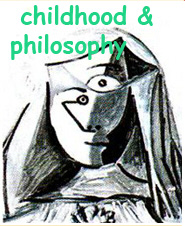what happens in philosophical texts: matthew lipman's theory and practice of the philosophical text as model
Keywords:
Matthew Lipman, philosophical narrative, Descartes, FoucaultAbstract
This paper explores Matthew Lipman's notion of the philosophical text as model. I argue that Lipman's account of the philosophical text is one that brings together the expository and narrative textual forms in a distinctive way--not one in which the tension between the expository and the narrative is overcome once and for all, but in such a way that the expository and the narrative are brought into relationship within the very form of narrative itself. Drawing upon Michel Foucault's reading of Descartes "Meditations," I argue that Lipman's philosophical novels serve both a demonstrative and ascetic function, allowing us to situate Lipman's novels in the history of philosophical discourse, as well as point to the task of creating philosophical texts, and curriculum, in the future.Downloads
Download data is not yet available.
Downloads
Published
2011-06-26
Issue
Section
articles




